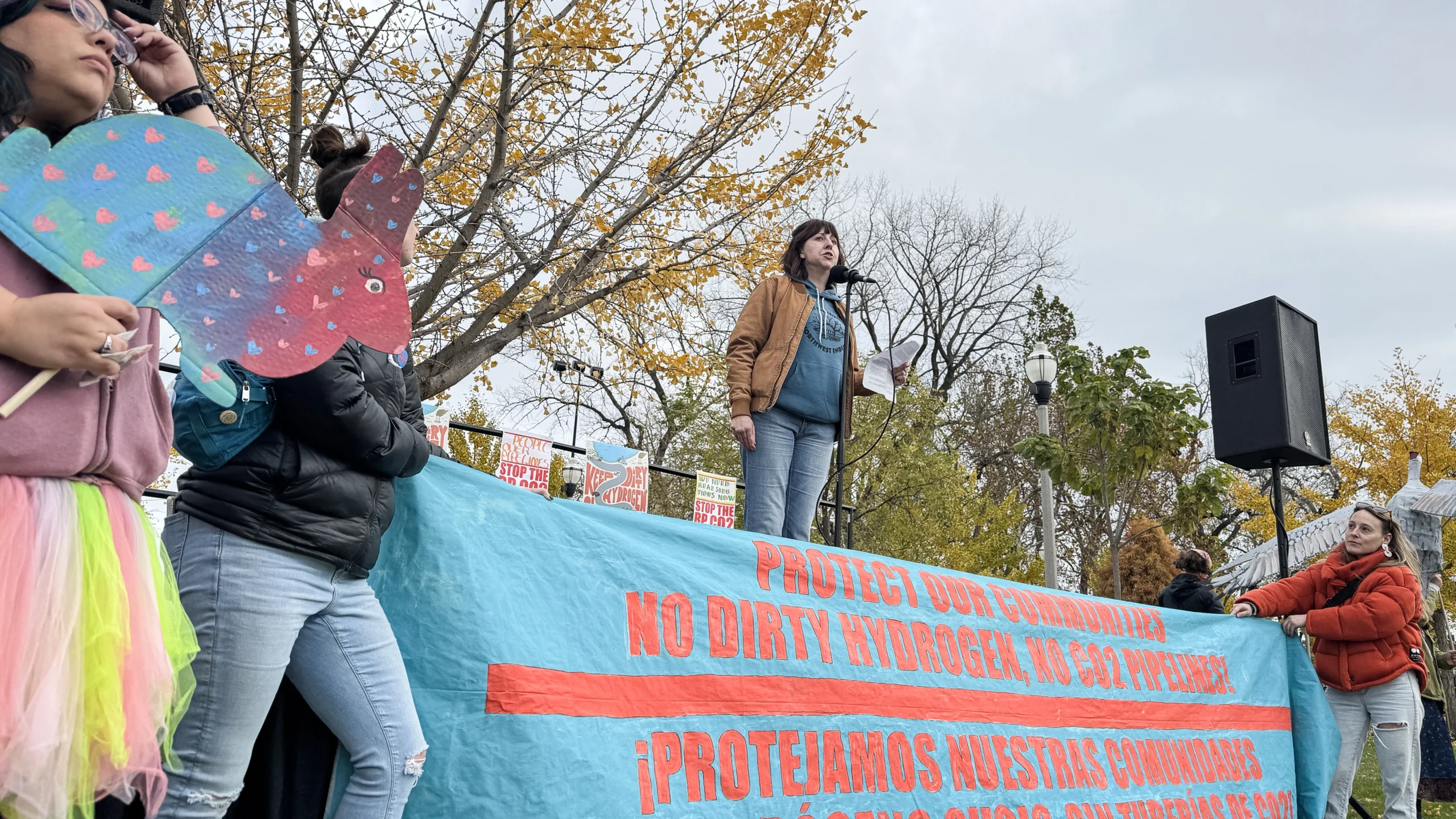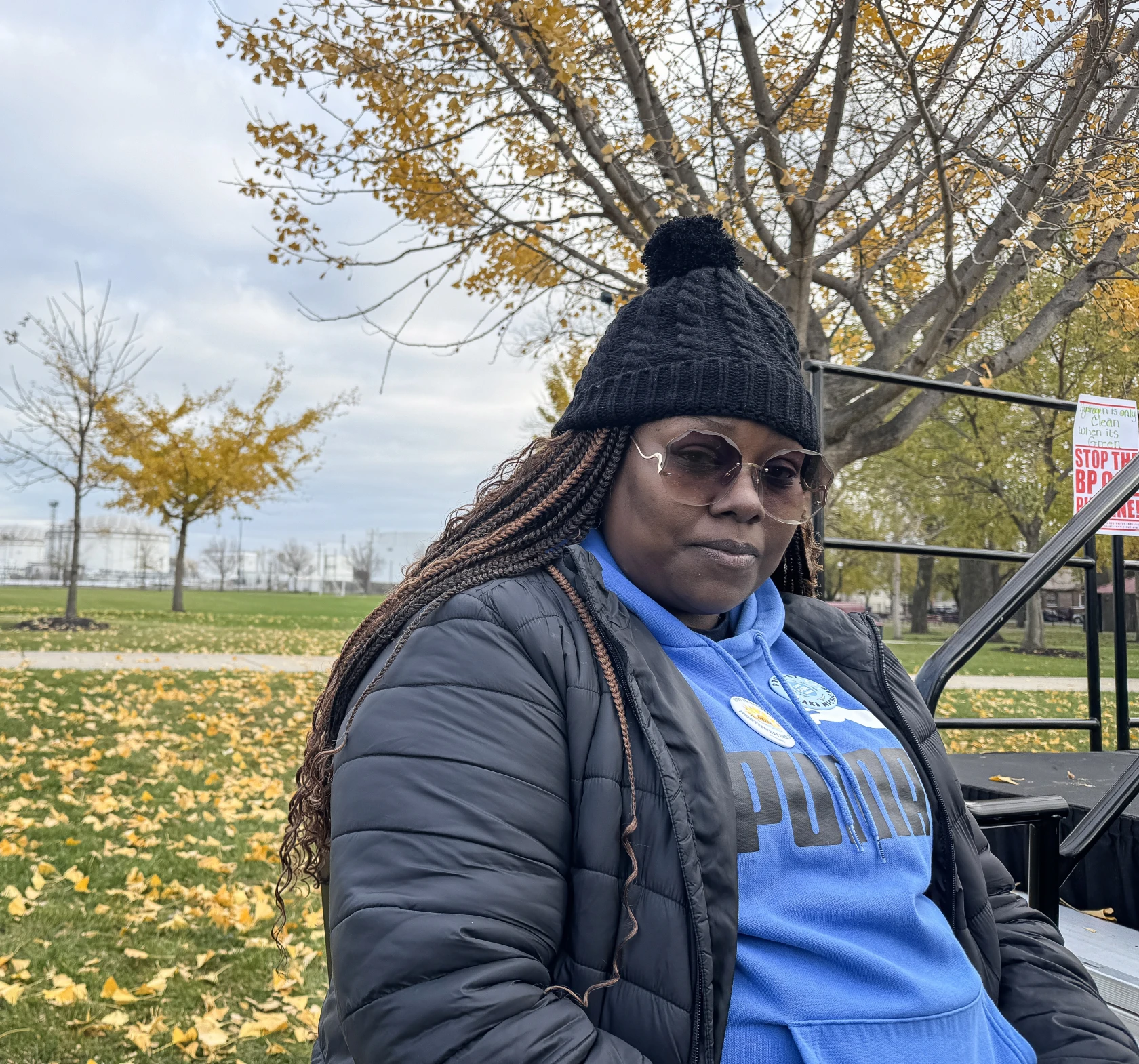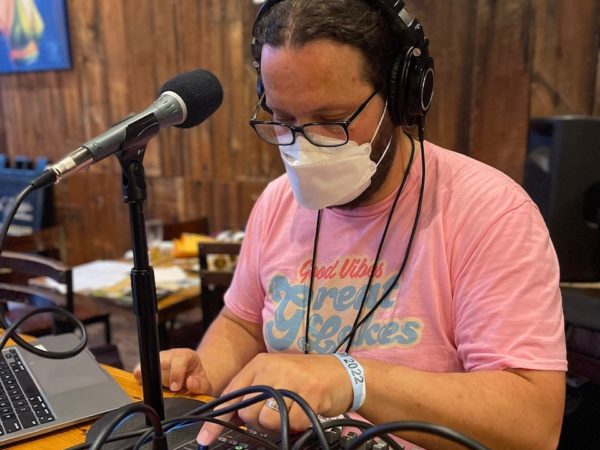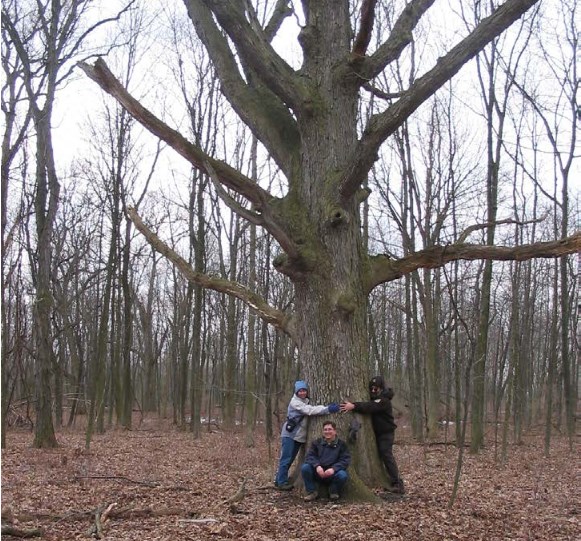
By Juanpablo Ramirez-Franco, WBEZ
This coverage is made possible through a partnership between WBEZ and Grist, a nonprofit, independent media organization dedicated to telling stories of climate solutions and a just future. Sign up for WBEZ newsletters to get local news you can trust.
U.S. Department of Energy is rolling out the first installment of its $1 billion commitment to ramp up hydrogen production in the Midwest as part of a bid by the Biden administration to lock in a nationwide roadmap for decarbonization, but local environmentalists are worried about fossil fuel companies greenwashing the project.
Proponents of the local investment in hydrogen as an alternative to fossil fuels say it will slash emissions and create green jobs. But local environmentalists argue it is a shell game that allows oil and gas companies to continue business as usual.
“These hubs are being built across the country in our backyards, without transparency, without our consent, and under the lie that hydrogen is a clean energy source and magic wand that will solve climate change,” said Lisa Vallee, organizing director with Just Transition Northwest Indiana, an environmental justice organization. She spoke at a recent rally against the hub.

A dance troupe of young girls in traditional Mexican folk dresses perform at a rally against a proposed hydrogen hub in the region, which took place in front of BP’s oil refinery in the majority Hispanic city of Whiting, Ind. on Nov. 16. (Juanpablo Ramirez-Franco/WBEZ)
The Midwest Hydrogen Hub, which is set to span Illinois, Iowa, Indiana, and Michigan, was awarded $22.2 million — part of up to a $1 billion federal cost share grant. The hub is led by the Midwest Alliance for Clean Hydrogen, also known as MachH2, a collection of public and private entities including manufacturers and universities across the region. The goal is to use hydrogen to decarbonize industries like steel making, glass production and heavy-duty transportation, among others. The $22 million is part of a $2.2 billion Department of Energy cost-share award announced last week to jumpstart “hydrogen hubs” across the Midwest and Gulf Coast.
The hubs are one part of a nationwide effort to build a new green economy around slashing planet-warming carbon pollution. The Biden administration has promised to deliver a total of $7 billion to fast-track clean hydrogen production via the development of seven regional hydrogen hubs spanning over a dozen states. Three other regional hydrogen hubs covering Appalachia, California, and Pacific Northwest landed their first phase of funding, a total of $87.5 million in federal dollars earlier this year. Two hubs have yet to receive initial funding.
The Midwest Hub, which has the potential to expand into nearby states, will produce more than 1,000 metric tons per day of clean hydrogen using wind power, natural gas and nuclear energy to be used in industries like steel making and heavy duty transportation, according to a factsheet from the DOE. It’s projected that decarbonizing these industries could cut carbon emissions by approximately 3.9 million metric tons per year. The hub is projected to create some 12,000 jobs over its lifetime.
Despite President Trump’s hostile stance on federally funded clean energy projects, MachH2 officials remain optimistic about the future of the project, “regardless of changes that ebb-and-flow between administrations,” according to Neil Banwart, the chief integration officer at the Midwest hub.
Still, environmental advocates in Northwest Indiana, where BP is considering a hydrogen production facility near its oil refinery as part of the hub, have strong reservations.

Environmental activist Akeeshea Daniels, 48, waits to speak at a rally against BP using fossil fuels to produce hydrogen on Nov. 16, in Whiting, Ind., near BP’s refinery. (Juanpablo Ramirez-Franco/WBEZ)
“We’re seeing that a lot of the same fossil fuel companies that have invested in fossil fuel infrastructure want to keep their assets online,” said Lauren Piette, a senior attorney with Earthjustice, an environmental law organization. “They see hydrogen as a way to kind of greenwash their dirty projects of the past.”
The vast majority of hydrogen manufactured in the United States today is produced with natural gas. Although the Biden administration is pushing “clean hydrogen,” advocates say that anything that keeps fossil fuels online — especially natural gas — isn’t clean.
“The key here is that hydrogen has a potential to help us decarbonize if it is made in a way that is truly clean,” said Piette.
Hydrogen, an abundant and odorless gas, is a potentially carbon-free fuel source. To make hydrogen, electricity is used to split hydrogen molecules from water. But producing hydrogen is energy intensive, and where that energy comes from makes climate advocates question the “clean” branding.
Hydrogen production is color coded based on the energy source used to produce it. Green hydrogen, for example, denotes that the power comes from renewables, like solar or wind. Pink hydrogen sources its power from nuclear energy. Blue hydrogen comes from natural gas and then traps emissions using carbon capture. When it comes to defining “clean hydrogen,” advocates want to draw the line at green.
As a result, some kinds of hydrogen production will inevitably produce more carbon pollution than others. But, according to Banwart, they all contribute to the decarbonization effort.
“If you look at the carbon intensity of all of our projects, which will be measured throughout the life of this hub, you will find the carbon intensity is very low,” Banwart said. “And thus, all three forms of production would be true, clean hydrogen.”
Banwart said that green, blue and pink hydrogen will all be produced across the hub. However, he said it is still too early in development to comment on what the exact mix will look like.
The initial $22.2 million dollar installment, MachH2 officials say, will go toward the first phase of planning, design, and community and labor engagement. This phase is expected to last 18 months, so construction is still years away.
Catch more news at Great Lakes Now:
Trying to build a more climate-resilient Chicago, one balloon at a time
South Shore residents are fed up with garbage on their streets
Featured image: Lisa Vallee, with the environmental justice organization Just Transition Northwest Indiana, speaks at a recent rally in Whiting, Ind. She and others oppose using fossil fuels to produce hydrogen as part of the Midwest Hydrogen Hub, which will span Illinois, Iowa, Indiana, and Michigan. (Juanpablo Ramirez-Franco/WBEZ)




